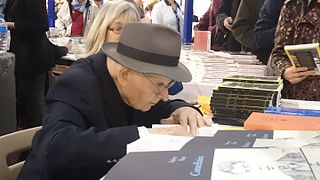A Quote by Samuel Johnson
It is, however, not necessary, that a man should forbear to write, till he has discovered some truth unknown before; he may be sufficiently useful, by only diversifying the surface of knowledge, and luring the mind by a new appearance to a second view of those beauties which it had passed over inattentively before.
Related Quotes
Therefore, philosophy does not give sense in mind happiness. It keeps in mind the only truth. However, it is very possible that the truth may be painful, may be distressing, may be destructive of happiness or makes it impossible. Religion, unlike philosophy, is under the category of the useful one. It promises happiness and says what it is necessary to do and what it is necessary to be to deserve or to obtain it. Consequently, illusion is more important than truth if it gets happiness.
The regularity with which we conclude that further advances in a particular field are impossible seems equaled only by the regularity with which events prove that we are of too limited vision. And it always seems to be those who have the fullest opportunity to know who are the most limited in view. What, then, is the trouble? I think that one answer should be: we do not realize sufficiently that the unknown is absolutely infinite, and that new knowledge is always being produced.
The kind of knowledge which is supported only by observations and is not yet proved must be carefully distinguished from the truth; it is gained by induction, as we usually say. Yet we have seen cases in which mere induction led to error. Therefore, we should take great care not to accept as true such properties of the numbers which we have discovered by observation and which are supported by induction alone. Indeed, we should use such a discovery as an opportunity to investigate more exactly the properties discovered and to prove or disprove them; in both cases we may learn something useful.
Ardent desire for knowledge, in fact, is the one motive attracting and supporting investigators in their efforts; and just this knowledge, really grasped and yet always flying before them, becomes at once their sole torment and their sole happiness. Those who do not know the torment of the unknown cannot have the joy of discovery which is certainly the liveliest that the mind of man can ever feel.
All those formal systems, in mathematics and physics and the philosophy of science, which claim to give foundations for certain truth are surely mistaken. I am tempted to say that we do not look for truth, but for knowledge. But I dislike this form of words, for two reasons. First of all, we do look for truth, however we define it, it is what we find that is knowledge. And second, what we fail to find is not truth, but certainty; the nature of truth is exactly the knowledge that we do find.
Problems may be solved in the study which have baffled all those who have sought a solution by the aid of their senses. To carry the art, however, to its highest pitch, it is necessary that the reasoner should be able to use all the facts which have come to his knowledge; and this in itself implies, as you will readily see, a possession of all knowledge, which, even in these days of free education and encyclopaedias, is a somewhat rare accomplishment.
The task of an author is, either to teach what is not known, or to recommend known truths by his manner of adorning them; either to let new light in upon the mind, and open new scenes to the prospect, or to vary the dress and situation of common objects, so as to give them fresh grace and more powerful attractions, to spread such flowers over the regions through which the intellect has already made its progress, as may tempt it to return, and take a second view of things hastily passed over, or negligently regarded.
Another argument of hope may be drawn from this-that some of the inventions already known are such as before they were discovered it could hardly have entered any man's head to think of; they would have been simply set aside as impossible. For in conjecturing what may be men set before them the example of what has been, and divine of the new with an imagination preoccupied and colored by the old; which way of forming opinions is very fallacious, for streams that are drawn from the springheads of nature do not always run in the old channels.
The four points of the compass be logic, knowledge, wisdom and the unknown. Some do bow in that final direction. Others advance upon it. To bow before the one is to lose sight of the three. I may submit to the unknown, but never to the unknowable. The man who bows in that final direction is either a saint or a fool. I have no use for either.
Do you see the slightest evidence anywhere in the universe that creation came to an end with the birth of man? Do you see the slightest evidence anywhere out there that man was the climax toward which creation had been straining from the beginning? ...Very far from it. The universe went on as before, the planet went on as before. Man's appearance caused no more stir than the appearance of jellyfish.
You may dazzle the mind with a thousand brilliant discoveries of natural science; you may open new worlds of knowledge which were never dreamed of before; yet, if you have not developed in the soul of the pupil strong habits of virtue which will sustain her in the struggle of life, you have not educated her, but only put in her hand a powerful instrument of self-destruction.
Under capitalism the common man enjoys amenities which in ages gone by were unknown and therefore inaccessible even to the richest people. But, of course, these motorcars, television sets and refrigerators do not make a man happy. In the instant in which he acquires them, he may feel happier than he did before. But as soon as some of his wishes are satisfied, new wishes spring up. Such is human nature.
The artist should paint not only what he sees before him, but also what he sees within him. If, however, he sees nothing within him, then he should also refrain from painting that which he sees before him. Otherwise, his pictures will be like those folding screens behind which one expects to find only the sick or the dead.




































